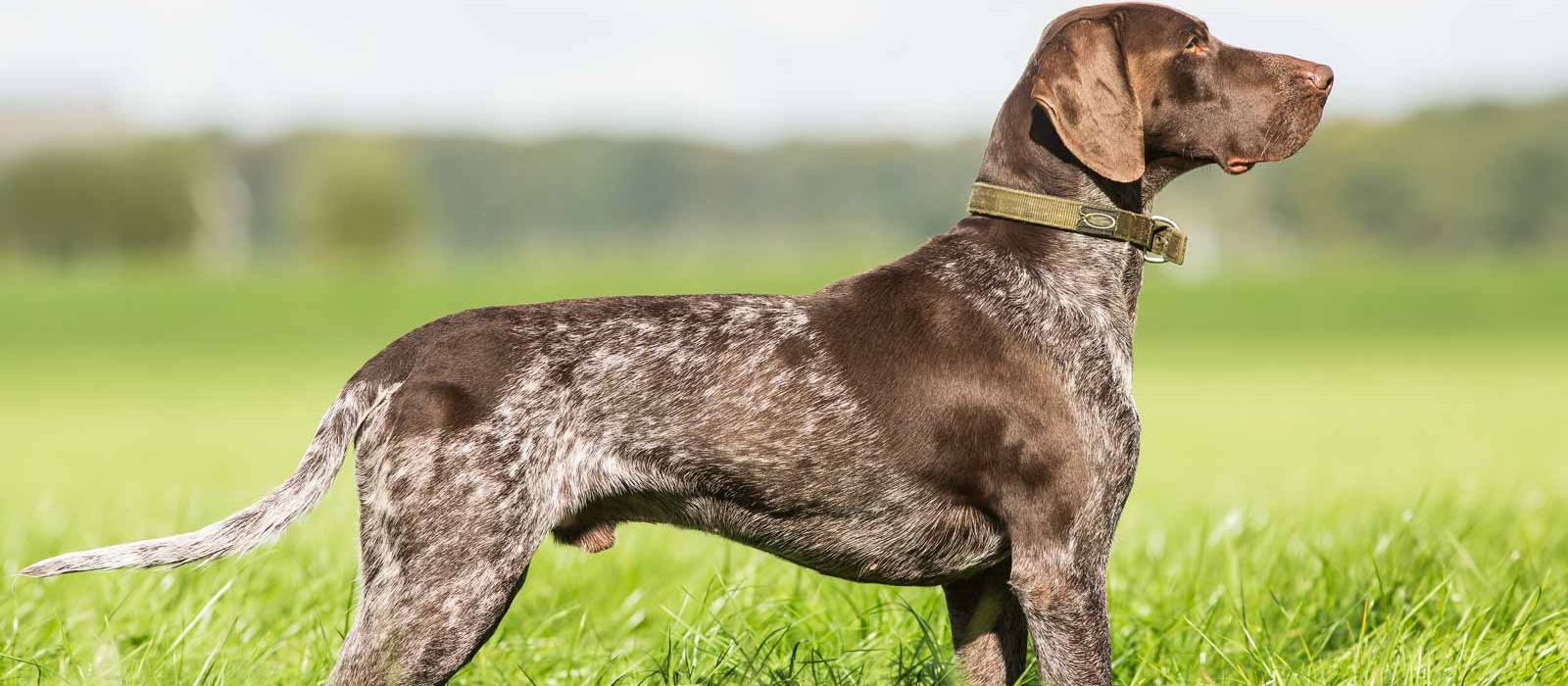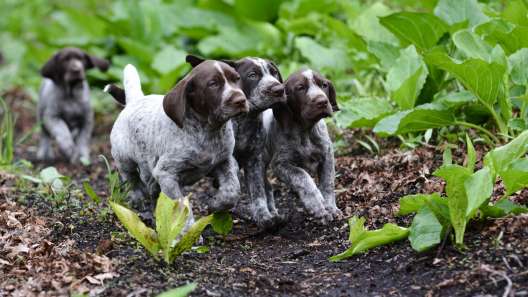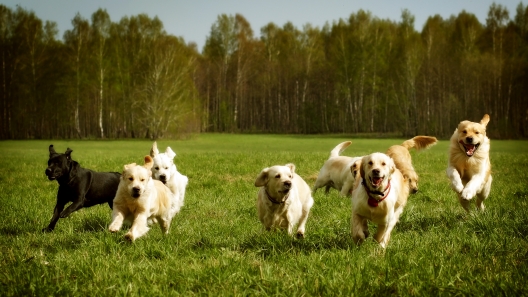-
Activity Level:
high
-
Shedding Level:
low
-
Grooming Level:
low
-
Trainability:
moderate
-
Good for Novice Owners:
moderate
-
Adaptability:
moderate
-
Kid/Pet Friendly:
often
-
Prey Drive:
high
-
Watchdog:
very alert
- Average Size: Medium
- Average Lifespan: 10-12 years
- Registered?: aca, akc
German Shorthaired Pointer Dog Breed Information
Overview
Temperament
Adaptability
Health
Owner Experience
Grooming
Activity Level
Size
Life Span
Did You Know?
The German Shorthaired Pointer’s (GSP) extraordinary versatility may account for its popularity – even celebrity – during the nineteenth and twentieth centuries. This dog breed was featured in numerous works of fiction by well-known authors as the smart, agile, and loyal sidekick to the stories’ heroes.
Prior to this, the GSP was bred to be a superb hunting dog. One of the facts about German Shorthaired Pointers is that they were bred to be uniquely suited for hunting fowl and small prey as both a pointer and a retriever. They were even competent trackers for deer hunters.
The AKC recognized the German Shorthaired Pointer in 1930 as a member of the Sporting Group. During World War II, German Shorthaired Pointers were so valued that they were smuggled away along with other valuables such as jewels and artworks to avoid confiscation in Nazi Germany.
Because of the German Shorthaired Pointer’s intelligence, dependability, and sporting talents, they are considered one of the best hunting companions. Yet, the elegant and athletic GSP also makes an outstanding family companion. These energetic dogs are highly sociable and really work to please their human families. They are highly trainable and will perform for praise or food.
“Enthusiastic” is a good all-around adjective to describe a German Shorthaired Pointer’s personality. They are intelligent and cheerful in a stimulating and nurturing environment. They tend to be affectionate “velcro dogs” that do like to be left alone. They prefer to be with their families and thrive on attention from them.
Well-socialized GSPs tend to get along well with children, other dogs, and sometimes other pets. They do have a high prey drive so they will need extra training and socialization around smaller pets in the household. They generally can do well with small pets they were raised with, but will usually maintain that urge to chase prey-type animals outside of their family.
German Shorthaired Pointers tend to bark to alert you. Provided they are socialized well, barking should not become a nuisance. It’s not a bad idea to train your dog to stop barking early on to keep it from going beyond alerting and becoming an issue.
German Shorthaired Pointers can be highly adaptable dogs. Their energy level tends to make them a better fit for homes with fenced yards where they can run freely. They can adapt to apartment living as long as plenty of time is dedicated to giving them enough exercise and attention every day.
They do well in most climates, but are sensitive to heat and cold. Their short coat may mean they need some winter dog products to stay warm while out on cold winter walks. Because they bond so closely with their families and crave attention from them, they do not like to be left alone for long periods of time. On top of experiencing separation anxiety, especially if you do not work them on it early on, they also get bored easily.
Potential health concerns to be aware of in German Shorthaired Pointers can include hip dysplasia, elbow dysplasia, entropion, progressive retinal atrophy, Von Willebrand’s Disease, and heart disease. Good breeding practices make a big difference in the health of puppies.
Reputable breeders will screen their dogs to avoid passing preventable issues to puppies. Make sure you talk to the breeder about the health and genetic history of both parents. You can also ask about any health tests or clearances that have been done. The German Shorthaired Pointer Club of America recommends a hip and elbow evaluation, ophthalmologist evaluation, cardiac exam, and cone degeneration DNA test.
As a barrel-chested dog breed, the German Shorthaired Pointer is at a higher risk of bloat. Because bloat in dogs can be dangerous and quickly becomes fatal if the stomach flips (gastric torsion), it’s important to know how to reduce the risk and what symptoms indicate it’s time to get help.
German Shorthaired Pointers are highly trainable dogs that can be a good fit for owners of all experience levels. They are intelligent, pick up on things quickly, and are eager to please. They also get bored easily and have a lot of energy, which can be difficult at times for first-time dog owners.
This dog breed responds best to consistent training with clear expectations and positive reward and praise. Even if you don’t necessarily need them for help with training, there are several benefits of puppy training classes. It’s generally a good idea to plan to enroll in them even if you aren’t sure you will need them.
GSPs have a short coat that will shed a little year-round and slightly more as the seasons change. Brushing a few times a week and a bath as needed are enough to keep their coat looking great. As one of the sturdy dog breeds for outdoor adventures, you may need to bathe your GSP more often depending on what they get into.
In addition to coat care, you will also need to take care of your German Shorthaired Pointer’s nails, ears, and teeth. Cutting nails once or twice monthly is usually enough to keep nails from growing too long.
Weekly ear checks and carefully cleaning your dog’s ears when needed can help prevent ear infections. Daily tooth brushing, along with cleanings at the vet when needed, is ideal for preventing painful dental diseases later in life.
German Shorthaired Pointers are high-energy dogs that need a purpose and get bored easily. Daily walks plus playtime and time to run can be enough, but they will likely be up for more activity if you are.
It’s important to keep activities low-impact until puppies finish growing. Swimming can be a great option for you and your GSP when they are young. Their unique “liver” coat is actually water-resistant. This, plus their webbed feet, tends to make German Shorthaired Pointers excellent swimmers.
Once their bones are done growing and developing, and they are cleared for higher-impact activities by the vet, you can try a lot of other things. GSPs are versatile and athletic dogs that excel at a wide variety of dog sports and other activities. They are even one of the dog breeds that make great running partners.
A fully-grown German Shorthaired Pointer usually stands 21-25 inches tall and weighs 45-70 pounds.
German Shorthaired Pointers generally live for 10-12 years on average.
In 1968, three out of the top four AKC National Field Trial Champions were German Shorthaired Pointers. In 2016, the winner of “Best in Show” at the 140th Westminster Dog Show was a GSP.









